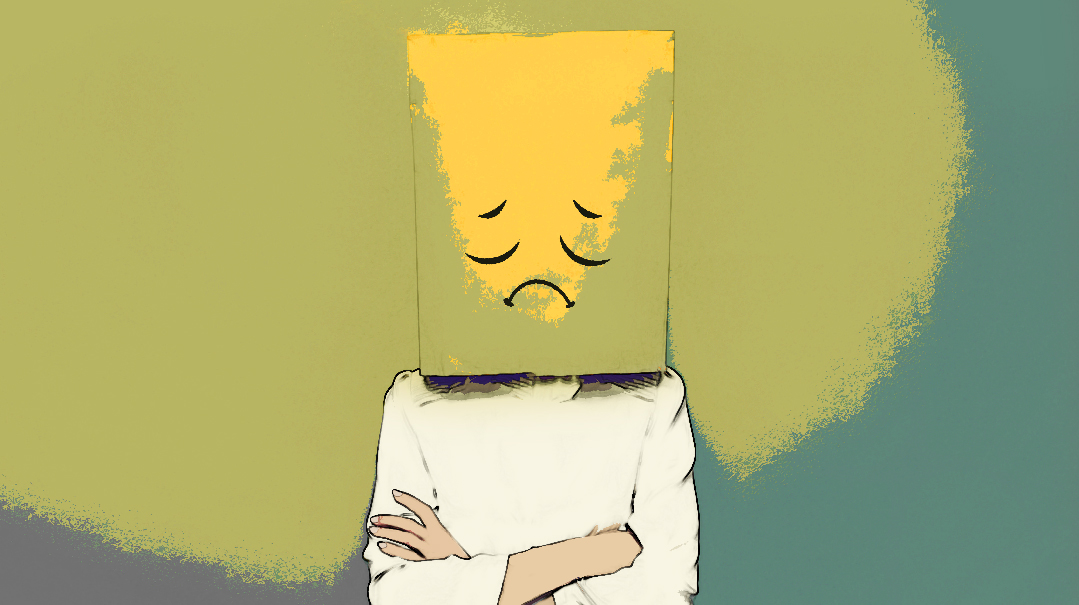Quality Control
| September 11, 2019“Why don’t you just yell at me? Tell me I’m wasting your time? That I’m a horrible mother and wife, and I should just get divorced and leave everyone well alone?”

Goals: To help Sarah overcome her Internet addiction
Tools used: Reality Therapy
Recap from Toolbox 7 (Chained) : Prompted by her husband, Sarah came to therapy for her technology addiction. She scored high on the Internet Addiction Test (IAT) and eventually came to accept that her phone and Internet use were making her life unmanageable. She joined an online 12-Step support group and was committed to trying to maintain sobriety, one day at a time. Sarah’s husband, Chaim, joined a Codependency 12-Step group, and sought help from a therapist. Sarah commits to regular therapy as part of the process of understanding what fueled her addiction.
One day, about two months after I first started seeing Sarah, she had a relapse.
“I don’t understand. I work so hard, I do the stupid meetings, I’m coming here, I’ve made tangible progress, and this happens!” she said. Her chest heaved from emotion and her fists were clenched. “It’s ridiculous. I know tons about addiction. We’ve spent so much time talking about it. And I saw it coming, but I couldn’t stop it. I told myself it wouldn’t happen, that I’d be fine.”
“Sarah, why don’t you back up? Start from what happened since I saw you last.”
“What happened is that I got a flier in the mail with an amazing offer on a new phone. I hid it, but it felt like it was burning a hole in my purse. So I went to the kiosk in the mall that had the promotion, and I got a new phone.”
“Okay…” I ventured.
“Then I told Chaim I was having a one-day training workshop for my job and checked into a hotel so I could surf uninterrupted. I barely brought enough food, but I didn’t care — I didn’t need anything else. I felt like I had my oxygen back. I was up the whole night. The only problem was that my coworker called looking for me in the morning for something stupid, and she totally blew my cover.”
Sarah paused, waiting for my reaction.
“Oops. What happened next?”
“Chaim called me all hysterical. We got into a huge fight. He’s barely been speaking to me since. And I had to get rid of the phone, and pay a huge penalty to get out of the contract.”
“Okay. Then what happened?”
“Abby! When are you going to react? Tell me what I deserve to hear?”
“What do you mean?”
“Why don’t you just yell at me? Tell me I’m wasting your time? That I’m a horrible mother and wife, and I should just get divorced and leave everyone well alone…?” Sarah’s voice cracked, and for the first time, I saw she was fighting tears.
“You know what the literature says. You’re sick, not bad. You’re struggling with an addiction, and you had a relapse. I honestly don’t think relapse has to be part of the process, but it’s certainly not anomalous. All your hard work didn’t disappear in those 24 hours.”
“Then why does it feel like that?”
“Does it?” I challenged.
“Yes. No. It doesn’t actually, but the shame I feel is suffocating, and Chaim’s being disgusting to me. He barely acknowledges when I walk into the room. He told me he’s ‘detaching for his serenity,’ but he could try to be nice!”
“It sounds like you feel rejected.”
“Rejected. Embarrassed. Worthless. Yup, that’s me. A real loser.”
“Hold on, Sarah. Before you get into self-deprecation, I want to back up. You said that you ‘saw it coming.’ What does that mean?”
“I didn’t totally know this would happen. But I felt myself getting itchy. Losing some steam, I guess. Two words: family simchah.”
“There was a simchah that was difficult for you?”
“All family simchahs are difficult for me. There’s a reason I live here in Montreal, and not near my family. But I couldn’t avoid this. My grandmother had her 90th birthday. I had to go in. And it was a disaster, as predicted.”
“It’s interesting that you didn’t mention anything about it in session. Do you know why?”
“I didn’t feel like getting into it. It’s so exhausting. And…” Sarah trailed off and her cheeks colored slightly.
“And… you didn’t want to tell me so we wouldn’t discuss a game plan so you could feel justified in acting out?” I said lightly, knowing the answer.
“Exactly. Isn’t that horrible?”
“Sarah, let’s take a break from all the criticism. Remember, behaviors like this are just a symptom of a problem, not the be-all, end-all of your personality. So, you know that family events are a trigger. Can you share a little bit more about why?”
“I’m really not in the mood to go there today. I feel so drained from everything.” She looked utterly exhausted.
“No problem. Do you want to talk more about what’s going on with Chaim at home?” I asked gently.
“Yes. I get where he’s coming from. He was so hopeful, and then I lied to him and went behind his back. But I wasn’t trying to hurt him. I wasn’t thinking about him, actually.”
“Right,” I interjected. “And that probably hurts him a lot.”
“I know. I hear how bad that sounds. But I have needs, too! He always makes it out like I’m the bad one, the selfish one, the one who needs to make amends. And I get it, I have to make it up to him and the kids. But what about me?”
“So, you feel that some of your needs are going unmet? Let’s talk about those needs. What do you think your basic human needs are?”
“Um, happiness?”
“Yes, but that’s very broad. Let me rephrase it. There were probably needs that you had as a child that may have gone unmet, and those may match the needs you have now that are going unmet.
“It’s likely that one of the main driving forces for your addiction is to fill these needs. So, what needs are fulfilled for you when you go online?”
Sarah spent several moments thinking. “Fun?”
“Yes, that’s one.”
“Freedom.”
“Good!”
“Belonging and acceptance?”
“Excellent, Sarah! You could add ‘love’ to that, as well.”
“Wait, this is a thing.”
“Yes, it’s actually ‘a thing.’ It’s called Reality Therapy, and it was conceptualized by a psychologist named Dr. William Glasser. The premise is that psychological issues and stress occur when our basic human needs go unmet. The theory is also pretty solution-focused, as it reinforces the fact that when we choose to change our own behavior rather than attempting to change someone else’s, we’re more successful at attaining our own goals and desires”
“Okay, so how many needs are there?”
“There are five. You already guessed three of them. Let’s break them down a bit. Fun is feeling a sense of satisfaction and pleasure; freedom is being independent, maintaining personal space and autonomy. Belonging and love is to feel part of a family and/or a community. There are two more needs: power, which is a sense of achievement or a sense of self-worth; and survival, which is food, shelter, etc.”
“That makes sense. So you’re saying when someone doesn’t have one of those needs met, then they can become addicts?”
“More accurate is when at least one, but sometimes all of those needs don’t get met on a consistent basis, we try to create those feelings for ourselves in potentially maladaptive ways. So, let’s say you’re feeling ostracized by your family, but you have unconditional acceptance in your online group or forum. Obviously, you’d seek connection with the person or people who are meeting your needs. Or perhaps you feel controlled or without as much personal choice in your life as you would want. You find freedom online where you can assert yourself on your own terms.”
“I totally get it. But there’s one problem… I never actually feel better after going online in a binge.”
“Correct! That’s because it’s maladaptive. The autonomy or belonging there isn’t the true freedom or connection you crave. It’s superficial and fleeting, but does fill a need in the moment. The goal of Reality Therapy is to be more aware of any negative thoughts and changing your actions so your needs are met in a healthy way.”
“So, with my Bubby’s birthday, I should’ve focused on what needs would go unmet there and then found better ways to fill that void?”
“Yes! Sarah, you’re really insightful! For homework, can you think of more specific needs within those categories and how you could meet those needs in a healthy way?”
“Okay! You know I hate homework, but I’ll at least think about it.”
“Great!”
Sarah and I scheduled a session for the following week, and she left looking less troubled than when she came in.
As Needed
When I saw Sarah the following week, she handed me a piece of paper.
“What’s this?” I inquired.
“I wrote down a few thoughts about my needs, and it ended up taking me back to some childhood stuff. I thought instead of avoiding it, we could look at it together.”
“Fantastic.” I handed the paper back to Sarah. “Why don’t you read the parts you want to share?”
“Um, okay. Well, the first thing that came to me was belonging. I never really felt comfortable at home. I have three sisters and two brothers. I’m the youngest, and the girls came first, then the boys. I have early memories of my sisters playing dress up with me. I was essentially their doll.
“But as I got older and developed a personality of my own, I suddenly had three additional mothers. They were always bossing me around and being critical of every little thing. My mom would sometimes intervene, but she was a little overwhelmed with the family, and later with her work commitments. She was just grateful for all the help my older sisters gave her so she didn’t step in too much. I got along well with my brothers, but then they went away to yeshivah, and there went my allies.”
“So you never felt part of the sister dynamic?”
“Exactly. I was either a source of their bonding, like the ‘what to do with Sarah’ conversations when I started acting out a bit as a teenager, or totally excluded. By the time I was bas mitzvah, my oldest sister already had two kids, and the next one was a kallah. They'd show up at the house and just expect me to do all the work or help with their kids as ‘payback’ for all they'd done for me when I was little.”
“That does sound both alienating and frustrating. Has it gotten better now that you have kids of your own?”
“No. We have this family chat, but I never post. And six months ago they went on a sisters’ trip to Florida. They told me like two days before they left — clearly an afterthought — and asked if I wanted to join, but it was so half-hearted, I'd never have gone with them and embarrass myself like that. And of course, Bubby’s celebration was planned to a T by the incredible trio, and got lots of praise and accolades from my mother. I was asked to bring cookies. Thanks very much.”
“By being excluded by them, it sounds like you’re missing out not only on belonging, but also on feelings of self-worth and fun.”
“Yes! And believe me, I’ve tried to talk to them. I know this is an issue and have tried to work it out in therapy before, but they don’t even hear me. They either wave it off or tell me that I’ve always been a spoiled brat.”
“That’s really painful, Sarah. I’m just thinking back to some of the things you’ve shared about Chaim and when you feel the most resentful toward him. It’s usually when he’s shutting you out. While that’s never a pleasant feeling, I’m wondering if it’s exacerbated by your history with your sisters. Perhaps old deep wounds are being activated in the context of your marriage? What do you think?”
“Yeah, I agree. Sometimes I even feel that way with my kids. It’s embarrassing to say, and I know it’s not logical, but when they want to do something with Chaim or go off with their cousins or something, I usually feel rejected. And then I feel stupid, because of course I want my kids to be happy.”
“Well, remember that emotional wounds and triggers are not necessarily logical. Often, they’re not part of the rational part of our brains, and so it would be excellent not to judge that reaction. Instead have compassion for yourself, or rather that ten-year-old inner child who may be kicking and screaming and feeling left out.”
“Okay, so I just sit here and have compassion for myself. What next?”
I laughed. “It’s not just about sitting around. At the heart of Reality Therapy is the idea that we can’t control others or change our pasts. The central question really is: What can I control about myself?”
“Uch, I hate control. Well, I mean I love it, but I hate when people try to control me.”
“Right. It gets problematic when people try to control other people, or when people use addictions — substances or behaviors — to give them a false sense of control. Obviously, there are many things that are out of our control, but healthy control means deciding how to respond to life events, and how to be in relationships with others in a mutually satisfying way because of the behavioral decisions you make.”
“Okay, so how do I deal with all the hurt and stuff with my sisters?”
“Well, from this perspective, the past shows us your wants and needs — to feel part of the sister dynamic — and it shows us that you respond to rejection by seeking control in unhealthy ways. Learning from that, you can decide what and who you want in your ‘quality world.’ Your quality world is an ideal, yet realistic depiction of your life.”
“How do I create this quality world?” Sarah asked curiously.
“Excellent question. What it means is taking an experience, past or present, and then focusing on how you can think or act differently in that situation, with the ultimate goal of connection in mind. Ask yourself: Is what I’m doing getting me closer to the people I need?”
“Wow, alright. So what does that look like with my sisters?”
“What do you think it looks like with your sisters?”
“I guess instead of dreading Bubby’s birthday and expecting them to leave me out, I could’ve been proactive a few months before, so I would’ve had more opportunity to be involved.”
“Yes! How do you think that would've played out?”
“Well, that’s the problem. I don’t trust that they would’ve responded properly and actually included me.”
“That’s a good point. There’s a risk that the positive action you take and the change you make will be rejected if the people you’re trying to reconnect with aren’t safe or stable figures in your life. This is where judgment and instinct do come into play. Developing your quality world has to be realistic, which means accepting that you can’t change others, only yourself. However, is it possible that from their perspective, you were never that interested in connection, and they may welcome a reframing of your adult relationship?”
“Maybe.” Sarah was lost in thought. “It’s hard to go there. There’s a lot of pain accumulated over many years.”
“Okay, so who is safe to practice that question with?” I asked Sarah.
“Chaim. I think Chaim’s safe. He also makes sense to work with because it’s a more present, daily relationship. So, do I have homework for next week?”
“Why don’t you keep a journal of a couple of interactions with Chaim, and if they were difficult, or even neutral, ask yourself, ‘What am I doing to make myself more connected to Chaim?’ ”
“Why do I recoil at the thought of asking myself that? It’s not like I have a bad marriage. I mean outside of all of this addiction stuff, we have a good relationship. I love Chaim. He’s a great person. But that question makes me cringe.”
“Totally. Emotional vulnerability can be cringeworthy when you’re not used to it. When you’ve had a long history of disconnection, or illusionary connection on the Internet, real connection may be difficult to achieve without a concerted effort.”
New Paths
“Okay, I’ll try it for this week and report back.”
The following week when Sarah walked in, she was practically triumphant.
“You won’t believe what happened!” Sarah breathed as she fell onto the couch. “I shared what you told me in a meeting and made an accountability arrangement with my sponsor to encourage me to do the homework.
“I got in a fight with Chaim over something. I don’t remember what. I think something to do with the kids. It was a total battle of the wills. And after some heated words, I got up and went into my room to grab my phone. I was just about to log into one of my chats, when I asked myself, ‘Am I connecting or disconnecting?’ I put down the phone and went to speak with Chaim. We worked it through, and the night was totally saved. It actually felt amazing!”
“Wow! That’s fantastic! On an emotional level and also on a neuro-biological level!”
“What does that mean?”
“Remember early on, in our first sessions, we discussed how your brain has been rewired to seek pleasurable reward feelings from your activities on the Internet?”
“Yes, you described it like a well-worn path. It’s an easy road to pleasure town.”
“Exactly. So, now, with this new, healthy interaction, you started paving a new path. It might feel like an overgrown jungle now. You may have to whack through some plants and trees, but eventually, it’ll become as comfortable as that other path. Our brains are super adaptive. The new, healthier route will soon replace the old one, if you keep taking positive action and taking charge of what takes place in your ‘quality world.’ ”
Sarah and I focused on her relationship with Chaim and her children each week. She practiced staying in the present and being in control of her current behaviors. This was all complemented by her 12-Step work and commitment to recovery. At this point, she’d connected to an all-female, frum 12-Step group for help with Internet addiction, and though it was based in New York, she went on two weekend retreats to connect to her fellow members and meet them face to face.
While she did have to confront her past in the course of her 12-Step work with her sponsor, which included making amends to her husband and children, she was able to balance the processing of her past with taking positive action in the present. Instead of blaming her past or using it a reason to justify acting out, Sarah used it as a tool for self-improvement and to provide information on how to develop her quality world and make positive choices.
One day, about a year into us seeing each other, Sarah came in with a big smile, her face clear and open. “Guess what? I’m going to Miami for four days.”
“That’s fun! When?”
“It’s more about with who… my sisters!”
“Wow! How’d that come to be?” I was delighted.
“I asked them if there was going to be a sister trip again this year, and then we started planning one altogether. I can’t say I’m not a little nervous. Our work has mostly been just about me or Chaim and the kids, but I feel strong enough to give it a try. I realize there may be moments when I may feel triggered, but I’ll go to an AA meeting there if I need to, I have my phone meetings and members to reach out to, and I have the tools to care of myself.”
“That’s incredible! I hear so much recovery and self-awareness. Amazing!”
She walked out of session that day grounded and happy, the complete opposite of how she presented one year ago.
Sarah’s journey continues, and I still see her at least twice a month. The depth of her progress and recovery was evident last Motzaei Shabbos at 11:48 p.m., when my cell pinged.
Hi Abby. Gut voch. Sorry to bother you, just wanted to let you know that the trip with my sisters was a success, and I didn’t even have an emotional crash when I came home. I spent Shabbos reconnecting with Chaim and the kids, and I just turned on my phone — three hours after Havdalah! I can honestly say that for today, I feel serene and an incredible sense of personal freedom.
I sat there, reflecting on how adaptive and resilient human beings are, and I was both humbled and inspired by Sarah’s journey.
Abby Delouya maintains a private practice in Montreal and works in schools as a youth and addictions counselor.
Disclaimer: This article is for psycho-educational purposes only, not diagnostic purposes, and does not serve as a replacement for individual therapy. Scenarios are a composite of people and situations and all identifying details have been changed.
Reality Therapy
There are several different interventions that can be useful when treating addiction. The Stages of Change framework (which I used with Sarah at the beginning of our treatment, see previous column), Motivational Interviewing, and Reality Therapy are the three most widely used interventions. They tend to be solution focused, yet require a lot of empathy, understanding, patience, and client empowerment and insight.
Reality Therapy is most effective only after a strong therapeutic alliance has been formed; in fact, this connection is considered by reality therapists to be the most important dynamic in facilitating healing.
Those in therapy can learn how to best strengthen relationships outside of therapy while in the “safe” therapeutic relationship, and as a result, be able to more easily expand on those methods in daily life.
By the time I introduced Sarah to the concept of Reality Therapy, she’d been coming to session for several weeks and there was a tangible connection and sense of safety and trust that had been developed. Part of Reality Therapy is to avoid blaming, criticizing, and judging. This is to model healthy external relationship behaviors that develop connection and also to focus on taking positive action for effective change.
An important part of Reality Therapy is the client’s constant evaluation of her current behavior, both to gain insight and to allow her to make her own judgments about her life and relationships, thereby exercising healthy control over her life.
Make it Yours
Want to bring Reality Therapy into your own life? Here are some questions to ask yourself:
- Am I feeling upset/sensitive/angry because my needs are currently going unmet?
- What needs are lacking? Freedom? Belonging/Love? Fun? Survival? Power?
- What positive action can I take for myself, knowing that I can't control others?
(Originally featured in Family First, Issue 659)
Oops! We could not locate your form.












